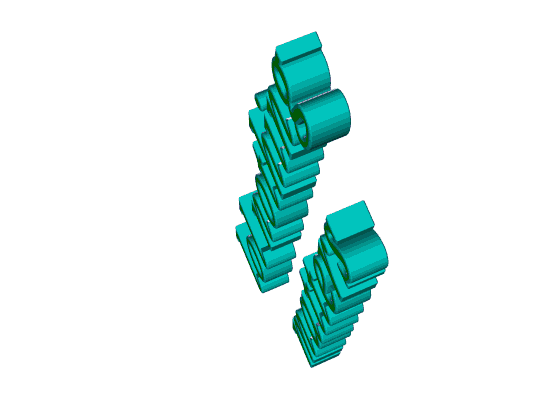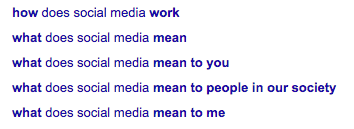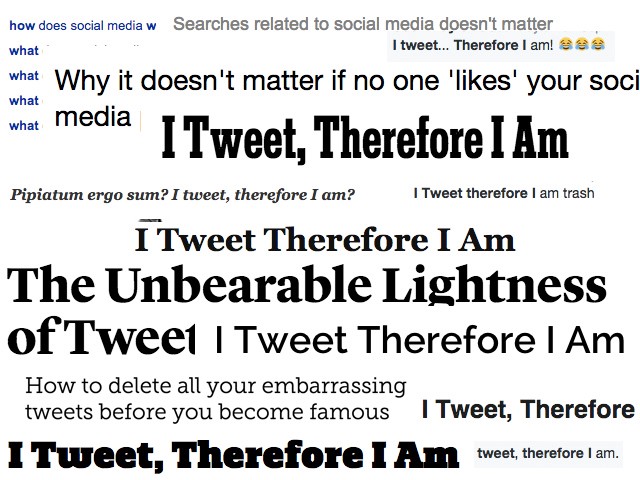LOL Everything Matters

“LOL nothing matters” is one of the best internal coping mechanisms I’ve ever adopted for myself. As a mantra, it lifts; as a philosophy, it protects. Without that private, constant repetition, I would probably never get anything done for fear of making the wrong move or saying the wrong thing. I mean, why even care about a grave mistake or a fatal error? LOL! Nothing matters!
But like most internal coping mechanisms, I have unfortunately discovered that “LOL nothing matters” is merely a Hello Kitty Band-Aid placed over a haemorrhaging wound. The consistent hum prodding us to devalue our words, our work, our conversations, and our preferred mediums for all three does not and will not insulate us from whatever it is we fear would happen if we admitted that the opposite is true. “LOL,” I’ve started saying, “everything matters.”

A v. existential question of our #time is a reference that performs as proof of intelligence, cleverness, timing: I tweet, therefore I am.
Like the medium itself, questions about Twitter are best served by density, joking inquiries packed with the most amount of information in the least amount of characters, questions or statements riding on preconceived ideas so that the intended audience can fill in the blanks with what they already know.

On Labor Day weekend I had several long, heartfelt conversations with my most trusted friend, and at the end of it the only advice I took immediately was to delete Twitter and Facebook from my phone. This was not, we agreed, the best course of action because those tools don’t matter. They mattered so much that I could no longer trust myself to use them responsibly: my twitter interactions are a basic unit of my social life, and what I read on my Twitter feed becomes the inside of my brain. I am, so I tweet.
Last week, Hairpin pal and confidante Jamie Lauren Keiles wrote an essay about using Instagram while depressed:
When you are depressed, people who have never been depressed are positively horny to offer advice and assessments of your situation. They say, Pull yourself up by your bootstraps and Fake it ’til you make it and It can’t be that bad. America contends with depression out of both sides of its mouth, treating it with medication like a valid clinical pathology, but blaming its sufferers for shortcomings of character and will. The reality is, depression weaves around and between these two categorizations in an unpredictable way — something that seems irrational and even impossible to someone who has never experienced it. There is plenty of space in the cultural conversation for stories about what it was like to have been depressed, but there isn’t much space or tolerance for narrating the experience in live time. That behavior, especially online, is called attention-seeking, or oversharing, or desperation. The sole exception to this rule is the cry for help, but the depressed person who isn’t sure which help to cry for is given little clearance to talk at all. On Instagram, I found a corner of the net where I was safe to shit out images of my terrible life in live time, without any imperative to express what I needed or interpret what it meant.
I often think the worst kind of social media post is the kind that offers a complaint without any identifiable object, as in, “I can’t take this anymore,” or “Done putting up with this shit.” This genre of content feels attention-seeking in a non-productive way, but with the benefit of hindsight I recognize such cryptic agitations as efforts to generate a personally satisfying sense of plot. Nothing ever happens when you are depressed. It’s boring. You lie in bed, or pass numbly through life, ruminating circularly on conceptual ideas in hopes of somehow thinking your way out of the hole. Being cryptic and sad on social media was a way of hitching my detachment to some publicly shared reality. I couldn’t have cried for help, for all the available help had been exhausted. It felt good and real to generate things that felt like plot points in a story as I laid in bed, waiting for the winds to change.
Like any good millennial narcissist, I read this story like a mirror I could reflect myself in. (Sorry Jamie.) The onslaught of commentary on social media — why social media, where social media, when social media, if social bad, if social good, and the other Mad Libs-ian kinds of essay prompts — have led to a reflexive “lol nothing matters” stance, which is the opposite of true. Jamie is right when she says that, in the absence of a real-life plot with momentum, the social media narrative arc fills in. Her experience of Instagram as a safe way to share what she needed to say is, I think, a common yet unacknowledged one. Pretending that your thumb-tapping actions don’t matter are just as silly as saying they matter more than anything, if not more so. Thanks Jamie.
We are, for the most part, a social species, and our lives revolve around a series of interactions with other people for a variety of reasons: we provide services for employers and have employees perform services for us, we form friendly or romantic attachments based on proximity and values, we nod when we pass in shared hallways. The idea that social media is purely performative, and therefore worthy of a hearty “lol” and a shrugging dismissal, pretends these interactions are different in kind. I mean, sure, lots of online-based conversations and relationships are weird and gross and best not examined too closely…just like, as many people before me have pointed out, lots of real life conversations and relationships.
But like the medium itself, questions about the worth of our collective Internet-based texts are valued by density, not insight: how many social ills or goods can we assign to this one extension of contemporary human behavior? How much does this new and untested technology matter, and how can we know before it’s too late?
I have begun to lean towards the “everything matters” school of thought because I believe this is the only mantra or philosophy that allows room for the compromises humans have to make in order to remain a social species. When we attempt to write, or speak, we’re compromising with every syllable, right? I’m pretty acutely aware of how limited my vocabulary is, or how often I fumble with grammar or syntax, trying to verbalize a thought or emotion so that my target (a friend, a listener, a reader, a follower) can truly understand me. Or even compromises with lower stakes: small talk at the office, polite nods on the subway. I’m also very aware of how often I fail and find myself misinterpreted, and try to correct myself before anyone notices. A sad photo on Instagram gets filed as a cry for help, or a subtweet hits the wrong target, so instead of confronting the idea that we’re all very limited in the ways we can communicate entirely we dismiss what we said before someone else does. It’s a joke, it didn’t matter, who cares, swipe left on literally everything.

A few weeks before that Labor Day conversation, I downloaded TweetDelete and carefully pressed the button that would, at least to the naked eye and lazy search function, wipe my Twitter slate clean. My colleague John Herrman, a regular (and my favorite) contributor to the subject of Why Social Media, once said that “time is a privacy setting,” and I had been thinking about it ever since.
A few months ago, a friend mentioned a joke I’d forgotten I posted more than a year prior, made about a sporting event I didn’t remember watching. That’s why I deleted my posts: because, looking at the archive, through months of content, not even I could figure out what I was talking about.
Twitter is a massive rolling context experiment, its conversations and subjects and audiences materializing and disintegrating constantly; a single user’s Twitter archive is a series of permanent and public contributions to discussions that have long since ended. A user’s posts referencing the Oscars also reference other users’ posts from the same time, and are experienced first in full transcript. In the archives, however, each speaker is isolated to the point of incoherence.
This is only a mortal risk if you’re in the habit of saying terrible things that you couldn’t defend if challenged, but a scattered trail of thousands of public messages, originally interpreted in the context of a feed but now only available one at a time and lacking context clues beyond a timestamp and maybe a link, still feels like a stupid way to represent yourself to the world. That you might be able to explain them if asked, or reconstruct the context, is irrelevant, because that’s not how they’ll be experienced: they’ll show up in a search, where their decontextualized strangeness, failing to rise to the level of actual inquiry, will nonetheless leave some kind of impression.
I also downloaded my archive and scrolled through conversations with people I love that I didn’t even remember, not because they didn’t matter; at the time I remember them mattering so much, proof that I was worthy of attention. I didn’t remember them because of volume (Too Many Tweets) and distance (A Tweet Too Far) but seeing them was like hearing a particularly emotionally charged song or smelling a poignant scent. Everything came flooding back. They had mattered then, and they mattered now, but they were going to matter whether they were there forever or floating in some void. I pressed delete.
The emails came (oh my god you deleted your tweets how does it feel) followed by the texts (is there something wrong with my app or did you delete your tweets) and the subtweets (honestly why would anyone delete their tweets) followed by the full circle of public and private opinion that Twitter is known for: hey, they asked me through screens, on phone calls, at bars, should I delete my tweets?
For me, this was an attempt to move my plot points forward, as Jamie mentions. Threads lived without me and mentions became dead links. I am inclined to rank this as a mild form of self-preservation after a long period of bad behavior, like sleeping for ten hours in a row or applying a really rich moisturizer to very dry skin, like I remembered to do something productive or helpful. Some people noticed and some people didn’t, and I felt weird about it until I didn’t, and then it became so commonplace to watch my tweets evaporate and to have nothing to scroll through on my phone when I was temporarily bored that I stopped noticing the absence entirely. Maybe it was similar to driving a car (which, like navigating the Internet, I also do not know how to do), in that objects appeared closer as they receded into my peripheral vision.
So…now what?! By putting this on a website and, of course, tweeting it within seconds of publishing, I am committing myself to a new sort of performance about what social media means to me: The Girl With The Tweet Delete Button. That’s ok, I think!! It all matters as much as any other kind of thought I try to remove from my head and put out into the world (I am feeling a strong pull to offset this sincerity with a joke by saying “so, not much,” but I will refrain). At this moment, I am thinking about how to be share something honest in a variety of places and platforms within their existing limitations because I think it matters. I’ll allow myself one joke: you can @ me if you like.